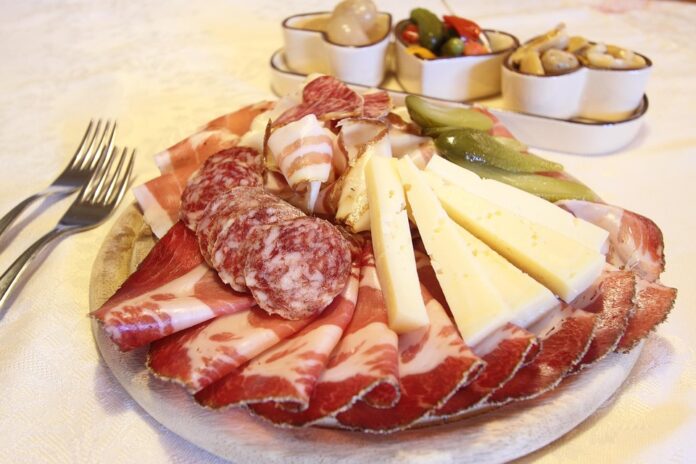Introduction
Traditional Speck from South Tyrol is a renowned cured meat product originating from the picturesque region of South Tyrol in northern Italy. This specialty ham is made from the hind leg of pigs, which are typically raised in the mountainous terrain of the Alps. With its unique blend of flavors and high-quality ingredients, Traditional Speck has gained international recognition and is now a protected product under the European Union’s Protected Geographical Indication (PGI) status.
What is Traditional Speck?
Traditional Speck is a type of cured ham that is dry-salted, smoked, and air-dried to perfection. The curing process involves using a blend of salt, pepper, juniper berries, and other spices to enhance the flavor profile of the meat. The smoking process is done using beechwood, which imparts a distinct aroma and taste to the Speck. The final step involves air-drying the ham for several months, allowing it to develop its signature texture and flavor.
Key Ingredients and Production Process
The key ingredients used in making Traditional Speck include high-quality pork from specific breeds of pigs, salt, pepper, juniper berries, and beechwood for smoking. The production process involves carefully selecting the meat, trimming off excess fat, and applying the salt and spice mixture. The ham is then left to cure for a specific period before being smoked and air-dried. This meticulous process ensures that each slice of Traditional Speck is packed with flavor and texture.
Protected Status of Traditional Speck
Traditional Speck from South Tyrol has been granted Protected Geographical Indication (PGI) status by the European Union, which recognizes the unique qualities and traditional methods used in its production. This status ensures that only ham produced in the designated region of South Tyrol, following strict guidelines and quality standards, can bear the name “Traditional Speck.” This protection helps preserve the authenticity and heritage of the product while also safeguarding the interests of producers in the region.
Impact of PGI Status on the Industry
The PGI status of Traditional Speck has had a positive impact on the industry in South Tyrol, as it has helped promote the product on a global scale. With consumers becoming increasingly interested in authentic and high-quality food products, Traditional Speck has gained popularity in international markets. This has led to increased demand for the product, creating new opportunities for producers and boosting the local economy.
Financial Data and Industry Insights
According to industry reports, the production of Traditional Speck in South Tyrol generates significant revenue for the region. The ham is exported to various countries around the world, with a growing market in North America, Asia, and other regions. The PGI status of the product has helped increase its value and demand, leading to higher prices and profitability for producers.
Market Trends and Growth Prospects
The market for Traditional Speck is expected to continue growing in the coming years, driven by increasing consumer awareness of the product and its unique qualities. Producers in South Tyrol are investing in modernizing their facilities and improving quality control measures to meet the growing demand for Traditional Speck. This trend is expected to drive further growth in the industry and solidify the reputation of South Tyrol as a leading producer of premium cured meats.
In conclusion, Traditional Speck from South Tyrol is a prized culinary gem that showcases the rich heritage and craftsmanship of the region. With its protected status and growing popularity, this specialty ham continues to captivate the taste buds of food enthusiasts around the world. The industry insights and financial data highlight the economic significance of Traditional Speck production in South Tyrol, underscoring its importance as a key driver of growth and prosperity in the region.



